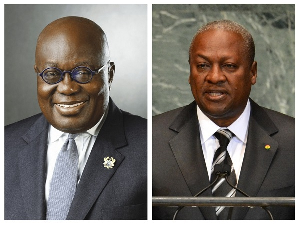 Prof. Yaw Amoateng is the author of the piece
Prof. Yaw Amoateng is the author of the piece
The history and pattern of voting in the present-day Bono and Ahafo regions since 1969, would tempt any political pundit to argue that these regions are the strongholds of the New Patriotic Party (NPP). To a large extent, such a pundit would not be far off the mark, except that this characterization of the three regions is not wholly true.
However, what is not known to the majority of the present-day members of the party in these regions--especially, the current leadership the majority of its member are youth in their thirties and forties--is the fact that this regional political behaviour is the result of a political re-alignment which flipped the regions from being a predominantly CPP stronghold to be adherents of the UP Tradition in 1969.
While the CPP-UP conflict for political supremacy in post-independence Ghana became the defining characteristic of our country’s politics in the 50s and 60s, nowhere in Ghana was this politics played out so intensely than the geographical area known as “Western Ashanti” (Later known as Brong/Ahafo).
Kwame Nkrumah’s promise to break the Ashanti front in the face of the National Liberation Movement (NLM) opposition through the creation of a separate administrative region for the Bono and Ahafo peoples endeared him to the chiefs and peoples of this area which was under Ashanti suzerainty to all intents and purposes.
This veiled defiance of imperial Ashanti hegemony metamorphosed into what became known as the Bono Nkyempem Movement which was led by such prominent paramount chiefs as Ekumfi Ameyaw of Techiman (The Capital of Bono East), Agyeman Badu of Dormaa, Fosu Gyeabour of Bechem, Abrefa Mmore Bediatuo of Wenchi and others.
When in 1959 Nkrumah fulfilled his promise of creating a separate Brong/Ahafo region, the only way the chiefs and peoples of Brong/Ahafo could reward him was with absolute political support for his Convention Peoples Party.
Granted, this political act by the chiefs and peoples of the newly-created Brong/Ahafo region was not unanimous as evidenced by the subsequent fratricidal violent conflicts between UP and CPP followers in the region.
Brong/Ahafo remained in Nkrumah’s corner politically until the 1969 general elections. Specifically, it was not until 1969 when Busia returned from political exile and contested the elections under the banner of the Progress Party (PP), another precursor of the NPP, that the Brong/Ahafo region flipped from being a CPP stronghold to being followers of the UP Tradition again.
While some party scholars have argued that this great political re-alignment in Brong/Ahafo was occasioned by the fact that Busia hailed from the region, I contend that there was more to this equation than that singular factor.
Specifically, my contention is that while Busia’s stature as a Brong/Ahafo citizen may have been an important factor in the re-alignment equation in 1969, the irony of General Afrifa, a quintessential son of the Ashanti soil, holding Busia’s hand and introducing him at the Coronation Park in Sunyani and telling Brong/Ahafo: “Bono people, your star has risen”, was not lost on the opinion leaders in the region and hence their resolve to embrace Busia and the UP Tradition with alacrity.
Why this detour with the historiography of the party in dissecting the modern day developments in the party in the Bono and Ahafo regions?
I take this approach to illustrate the fact that these regions are not absolutely the strongholds of the NPP as we all tend to assume. The regions’ political umbilical cords were cut in the crucible of CPP post-independence politics and enjoyed CPP largesse in the form of several socioeconomic amenities such as secondary schools in some key towns until Nkrumah’s ouster in the 1966 Military coup.
The fact that even in today’s politics, the Brong/Ahafo region is largely considered as a swing region attests to its historical tendency of seesawing between the UP and CPP political traditions. Thus, the political pendulum of the Bono and Ahafo regions is very much in motion and can swing to any side of the political divide any time depending upon myriad factors.
The Stirling performance of the Peoples National Party (PNP), a scion of the CPP tradition in the Brong/Ahafo region in the 1979 Presidential and Parliamentary elections and the inroads the NDC has made in the region since 1992, are all indicators of the NPP’s tenuous advantage in the balance of power in the regions in recent decades.
There is no doubt about the fact that the NPP is at the moment holding political sway in the three regions, however, given this history of the regions ever swinging, it is prudent that the party guards against any tendencies that might might have the potential to swing the pendulum back to the fold of any political grouping with a CPP pedigree.
Yet, since 2008, leaders of NPP at the regional and constituency levels have thrown all caution to the wind as far as party organisational discipline is concerned. The regional and constituency leaders who are supposed to help national leaders to select parliamentary aspirants of the party who are winnable have become party hacks whose personal interests are diametrically opposed to the interests of the party as a whole.
What has happened is that these mostly “charismatic” leaders at the regional and constituency levels are playing Machine Politics at the regional and constituency levels whereby Political Bosses, who, by definition, are long-serving sitting members of Parliament are their patrons. These sitting MPs are resourceful and are financially able to manipulate these regional and constituency leaders to do their bidding of staying perpetually in power.
These tendencies characterize all three regions and their constituencies but three constituencies in the Bono region have become emblematic of this incipient decay and decline in the party: Sunyani West, Dormaa Central and Wenchi.
It is significant to note that the trio in these constituencies have certain things in common: First, they have all been in Parliament for twelve years (3 terms). Second, all three MPs are still contesting to be in Parliament for their fourth terms and perhaps beyond. Third, all three MPs are Ministers in the present government ala the regional balance provision in the Constitution. Finally, all three MPs are serial underperformers with regards to local socioeconomic development.
What exactly are the mechanisms employed by these political bosses in our local politics in the Bono region?
SUNYANI WEST CONSTITUENCY: THE EXEMPLAR OF MACHINE POLITICS IN THE NPP
The present Sunyani West Constituency was carved out of the former Sunyani Constituency which consisted of both West and East under the current political firmament. The then Sunyani Constituency was represented by such UP stalwarts as Honorables J.H. Mensah (During Busia’s administration) and Owusu Sekyere (The Independent Member for Sunyani during the Limann
Administration), while Honourable Kwadwo Adjei-Darko represented the newly created Sunyani West Constituency for three terms (1997-2009) before he retired honourably.
The latter years of the Sunyani Constituency until the early period of the Sunyani West Constituency was indeed the Golden Age of the in the area in terms of both the quality of representation and party discipline at the local level.
As I have already alluded to, the aforementioned former MPs in the constituency were credible and accomplished men of the party who had gone through the political mill in terms of qualifications and their UP pedigree.
As a young boy growing up at Chiraa, a major town in the constituency, I remember some of these MPs cutting ribbons to deliver such vital services as electricity, health centers, tarred roads, state bus services to and from the regional capital, Sunyani.
I remember this Golden Age of the constituency vividly because my father was the Krontihene of Chiraa and in fact, the de facto chief of the town due to the de jure chief’s incapacity to govern the town due to his advancing age; I remember attending some of these durbars with my father where such socioeconomic services were delivered to this town and other major towns and villages in the constituency.
For example, during his tenure as MP, the Honourable J.H. Mensah was a frequent visitor to my father’s palace to consult with him on numerous local initiatives because of my father’s activism and interest in the town’s affairs. All the subsequent MPs’ tenures were based on their competence which was measured by the delivery of these basic services.
The living legacy of this illustrious service and achievements in the constituency by these sons of the soil is that both the Sunyani West and East Constituencies are become so-called safe seats for the party today.
However, since 2008 the quality of representation in the Sunyani West Constituency has taken a turn for the worst and continues to deteriorate. In fact, the prescience I had about this decline in the quality of representation in the constituency in the post-Adjei-Darko era was the primary motivation for my decision to contest in the party’s 2008 Parliamentary primary in the constituency. But, alas, I was advised by no less a person than Nana Akufo-Addo to step down.
At a meeting with Nana Akufo-Addo with the then Chairperson of the Constituency, the late Mr. Baidoo (a.k.a Agyaa) and the current Bono Regional Women Organiser, Madam Amma Amponsah at the Golden Tulip Hotel in Kumasi, Nana Akuffo Addo urged me to step down since the current MP, who was then the Brong/Ahafo Regional Minister, was better known on the ground.
For all intents and purposes, the Sunyani West Constituency in the Bono region has become the exemplar of the indiscipline and incipient decay in the party in recent years. In other words, the presence of some latter day members of the party who know nothing about the values and ideals of the party’s tradition has created disciplinary problems as far as party organisation goes.
As I have already indicated, the sitting MP of the constituency is currently in his third term in Parliament and still contesting for a fourth term and possibly beyond. The constituency has become the fiefdom of one person as a result of the Machiavellian tactics a cabal involving the entire constituency executives and its polling stations chairpersons on the ground; this has resulted in the MP imposing himself on the constituency to the chagrin of the constituents now.
Through unconventional, undemocratic tactics, Constituency elections are systematically compromised to make sure that elected executives, who are mainly poorly educated, are in his corner at the expense of upcoming, young and better educated men and women in the constituency.
The end result of the desire of the MP to stay in power perpetually is that the constituency has been rendered dysfunctional at best; no regular meetings are held at the local ward levels in any of the towns and villages that make up the Constituency, while the MP couldn’t care less about visiting these towns and villages to find out about the needs of the constituents.
For the three terms that the MP has been in Parliament, there is no record of him having held a single Town Hall to give an account of his mandate to the constituents simply because there are no achievements to talk about and no pressure from the ground up to compel him to render this account.
The only time you see the Honourable MP in the constituency is when another election cycle is around. He comes around with the cabal in tow taking the poor constituents for what a sociologist called “cheerful robots”; because of these people’s love for the NPP they will always vote for him, regardless of his concrete achievements.
What this cabal that sustains this sorry state of affairs in the constituency has succeeded in doing is that since 2017 when the current MCE, Hon. Martin Obeng, was installed, they have literally rendered the Constituency ungovernable. They have literally destabilized this affable man’s administration with incessant complaints simply because he beat the constituency Chairman in the race to become the MCE.
This unwarranted harassment of the MCE finally resulted in the Chairman and his executives forging other polling station executives’ signatures in presenting a false petition to the President of the Republic in a recent incident, a situation which has embarrassingly ended up in court because one smart polling station executive detected the falsity of the petition.
Finally, in this year’s election cycle, there was real hope of changing the face of Sunyani West in Parliament when at least three aspirants entered the race in that constituency but alas, the sitting MP was declared an “unopposed” contestant!
“What, what happened?” This was the question I posed to one local activist who whatsapped me about the outcome of the so-called vetting process in the constituency. The young man’s answer was “Prof, this is the question everybody has been compelled to ask and it is a difficult question to answer”.
The happenings in the Sunyani West Constituency are emblematic of the party organisation in the Bono region in recent years. The political bosses in the region and constituencies collude with their corresponding political hacks (Chairpersons and Constituency Executives) to manipulate the selection process to ensure that they stay in power forever.
This is done in two main ways. First, potential parliamentary aspirants are either disqualified through devious means to guarantee a safe passage for the incumbent MPs or secondly, where contests are inevitable, the party constituency albums are shrewdly manipulated to disadvantage aspirants in a “democratic” way.
What is unbeknown to these local party chairpersons is that the primary contests are a political barometer to gauge the prospects of the mother party in regard to the winning and maintaining of
political power which is the raison d’etre of a political party. The experiences of 2008 tell us that there is indeed an inverse relationship between the number of aspirants in a constituency and the popularity of the incumbent MP.
In other words, the number of new aspirants is a function of how unpopular the incumbent member of Parliament has become so any corrupt effort to ensure that an unpopular incumbent prevails in the primary contests does not inure to the benefit of the party in the general elections in the long run.
The fact of the matter is that most of the sitting MPs in the regions have become overstay their welcome and in the process become lame ducks with regard to the raison d’tre of their being in Parliament: Local socioeconomic development. They have become unpopular on the ground and risk losing in the general elections.
BUT THE BONO REGION IS NOT AN OUTLIER
But, the Bono region is not an outlier, statistically speaking, in terms of the ill-discipline which is becoming the hallmark of the NPP at the regional and constituency levels. In other words, the chronicle of my childhood experiences of party organisation and performance in the Sunyani West Constituency has become normative as far as party organisation nationally is concerned.
Anybody who is familiar with the history of our party will agree with me that in ideological speak, our party was the “conservative” party in our country in terms of its preoccupation with the preservation of our core cultural values, norms, and institutions as a people.
This preoccupation with preserving the core values of our society was no coincidence because the founding fathers of our political tradition hailed from the landed aristocracy and nobility in our pre- colonial society.
The party was formed by the offspring of this landed aristocracy (Chiefs, Kings and Queens) who had travelled outside the country to study and become the nucleus of the native intelligentsia (Lawyers, academicians, businessmen and women).
This was a group that brooked no disloyalty to the institution of chieftaincy for instance and formed a political grouping in the first instance to protect our chieftaincy heritage. Thus, to all intents and purposes, this group had a very conservative outlook on life and for a long time made this political formation an exclusive club of the elite, the crème de la crème of High society.
It is needless to say that this fundamental trait of the party cost us election after election during the immediate pre- and post-independence political contestations. It was therefore the desire to turn the party’s electoral fortunes around that motivated the slight ideological shift to become a Center- Right party under J.A. Kufuor with all the social intervention programs that sought to give membership to a broader array of citizens in the polity.
This push of the party from the Right to Center-Right was given further impetus by Nana Akufo-Addo during his leadership of the party in opposition when he expanded the party’s Electoral College to include all polling station executives.
But, truth be told, the drive to turn the party into an election-winning machine by broadening its base has had some unintended consequences which have become the Achilles’ heels of party organisation at the local level.
Specifically, this open door policy of the party has brought in its wake some elements with very little regard for the core values and beliefs that underlie the party (internal democracy, rule of law, respect for dissent etc.).
The end state of this “Massification” of the party is that we are now experiencing ill-discipline on a massive scale in the party of noble men and women of yesteryear. An obvious outcome of this massification of the party was the recent incidents in several regions and constituencies whereby a cabal of chairpersons sought to stifle internal debate and democracy by preventing other members from contesting sitting MPs.
Despite the efforts by prominent leaders of the party like former President J.A. Kufuor, Dr. Amoako Tuffuor, Honourable Kennedy Agyapong, Gabby Otchere-Darko and countless others to speak out against such tendencies in the party, some regional and constituency executives continued to put all sorts of obstacles in the way of others to contest some sitting MPs with the acquiescence of the sitting MPs many of whom do not know the traditions and beliefs of the party themselves.
The chaos and outright violence that took place in places like Adansi Asokwa, Bekwai, Dormaa West, Mampong etc. have only succeeded in putting the party in a very bad light, especially, for a party that prides itself on being the guardian of liberal democracy in our country. This, without a doubt, is a throwback to the 2008 crucible of ill-discipline which cost the party dearly at the polls.
Already several concerned party members have bemoaned the chaos and ill-discipline that characterized this year’s selection process and have expressed the fear that what happened in 2008 might recur in December. We are all praying and working hard to ensure that nothing of the sort happens in December. However, should something like that happen, I hope we would not seek to find our “fault in the stars, but in ourselves!”, as Shakespeare would have put it.
Thank you
PROFESSOR ACHEAMPONG YAW AMOATENG IS A SOCIOLOGIST AND A FOUNDING MEMBER OF THE NPP BASED IN SOUTH AFRICA.
- Let’s use your billboards for 2024 campaign – NPP begs ex-aspirants
- 2024 Polls: Presidency not for remedial candidates; reject Mahama - Sir John to Ghanaians
- If I could go back, I wouldn’t have given up my presidential position for Akufo-Addo – Alan
- Bawumia is a better thinker than Mahama on any scale – Salam Mustapha
- It’s not true! - NPP Nasara Coordinator denies endorsing NDC parliamentary candidate
- Read all related articles










